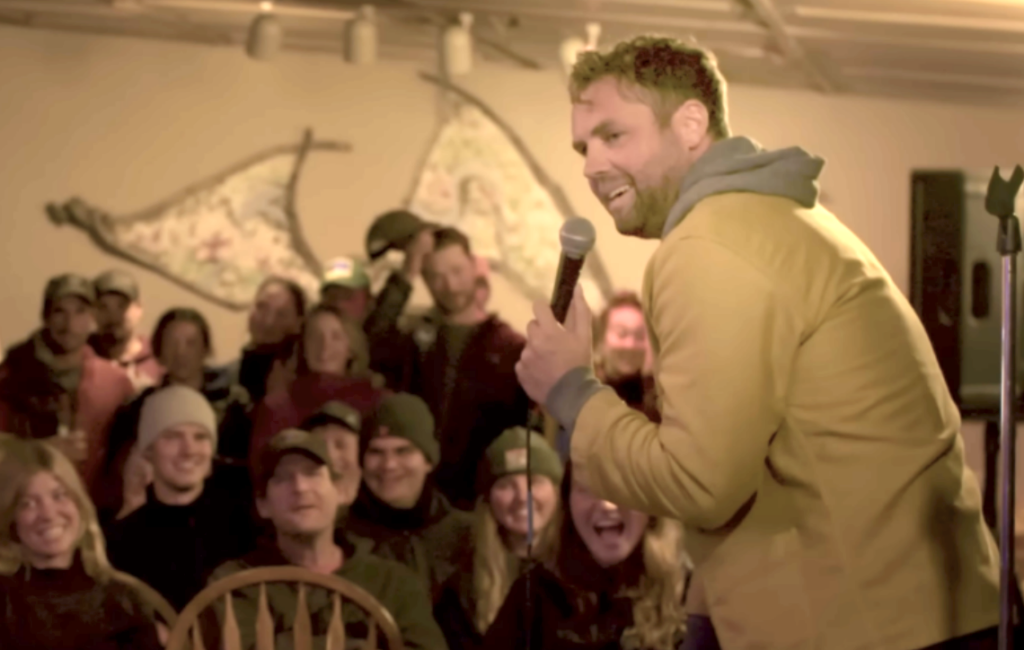Brendon Small on the return of Metalocalypse
Writer/actor/director/musician/et al Brendon Small would be a legend if he’d stopped with the creation of his Adult Swim animated series, Home Movies, in the early ’00s. Following it up with the heavy metal fantasy comedy of Metalocalypse secured that status for all time when it debuted in 2006.
Spotlighting the death metal band Dethklok, whose popularity makes them the seventh-largest economy in the world, Metalocalypse managed to skewer the music industry as effectively as Spinal Tap while also being a wild ride into interpersonal relationships, worldwide conspiracies, and a cocaine-addled clown based on David Lee Roth.
The series has been absent since its last special, The Doomstar Requiem, nearly a decade ago. It returns on Tuesday, August 22, with a feature-length series finale, entitled Army of the Doomstar, accompanied by both a soundtrack and a fourth Dethklok LP, Dethalbum IV. Ahead of its release, we hopped on the phone with Brendon Small to talk about Metalocalypse and its history.
 The Pitch: You’ve got this tour coinciding with a new album, a full movie, and a soundtrack to that movie. What’s it like, just dropping into this thing that you haven’t done for a while?
The Pitch: You’ve got this tour coinciding with a new album, a full movie, and a soundtrack to that movie. What’s it like, just dropping into this thing that you haven’t done for a while?
It’s really bizarre because, in many ways, I didn’t think I would ever do it. It’s really strange to say “yes” to all this stuff at the same time and go, “alright,” because the feeling is very bizarre. It really is like trying to go back to high school or something like that, and you’re like, “All right, I’m going back to high school—I’m in my forties, but I’m going back to high school.”
There’s something really odd and wrong about the feeling, but the way that we’re doing this, the way that this whole movie was conceived, and the way that it was landed was exciting enough for me to want to get back into it, ’cause the idea was, “How do we elevate everything? How do we make it more intense? How do we make it more cinematic? How do we make it more exciting for the makers of the movie and the audience at the same time? How does everybody get to win out?”
Also, doing this amount of creative work is a challenge I can’t back down from, you know? We did a show in 2019 that kind of opened the door, and shortly after the show we did, I was offered this movie and these coinciding records, and I thought, “This is a lot of work. It’ll actually take years to do this, but this is the whole reason to do the show—to finish it and to complete the arc.” A comedy TV show with no finish or no end, to me, is kind of a worthless endeavor because the whole idea is, in TV, characters are in stasis. They don’t change; they have to stay the same way, or at least in traditional TV that I was doing at the time when this show was on the air.
This is where I get to land the idea, the message of the whole thing, and to complete the arc. That was enough reason for me to wanna do it.
 What’s crazy about it is there’s not just a soundtrack; there’s a whole album to go with this. That first Dethalbum was primarily songs that were from the show itself. Now you’ve got this album, and there are maybe two songs in the actual film itself. Where does that creativity come from, where you’re just like, “Let’s not just do a soundtrack; let’s do an album?”
What’s crazy about it is there’s not just a soundtrack; there’s a whole album to go with this. That first Dethalbum was primarily songs that were from the show itself. Now you’ve got this album, and there are maybe two songs in the actual film itself. Where does that creativity come from, where you’re just like, “Let’s not just do a soundtrack; let’s do an album?”
You know, it was funny because it was pitched to me and basically said, “You’ll do a record with it.” I’m like, “Okay.” The way that this movie works is there are two important songs. There’s actually a third one that’s kind of alluded to, but it kind of snuck in there, which is the song “Dead Face.”
The question is, “How do I break the pattern?” First of all, the way that I did the other ones, I was making it up as I went along, which is that every episode had a song. Then I would kind of add, you know, bridges or odysseys or whatever it is to elongate them into a full-length song. That would be a secondary challenge after having written verse/bridge/chorus/whatever they didn’t have after 35 seconds of it on TV.
It’s a different challenge, right? What do I do with this, and how do I do it? And so that was the question. That puts me in a place where I go, “Okay, now that I know in 2020 that this is gonna come out in like 2023, let’s start demoing.” Basically, I’m sitting there, and I’m doing what I normally do, which is sit with my guitar, almost like I’m at like a slot machine in Las Vegas. I just pull the lever, and sometimes I get three tomatoes, and I’m like, “Okay, this is something I can maybe get to the finish line,” just as far as what a riff or two sounds like to me.
Sometimes I get an onion and a top hat and thimble and, and then like, “Okay, so that one doesn’t have anything,” and, “Oh, that one has two cherries and a lemon. I can do something with that.” I did like 30, 40 demos, and I was also just interested in—at the time, Dethklok was a reflection of what was going on in heavy metal. Then plus, I guess somehow my own personality gets stuck in there, or at least choices or ways of arranging that I’m interested in get snuck in there.
I wanted to do the same thing ’cause I didn’t want Dethklok to sound the same. I wanted them to acknowledge a modern soundscape and production and all that stuff. And also, the movie has two ideologies, which are the mystical and the aggressive and a clenched fist and fury, you know?
The movie also addresses the difficulties of the creative process, which is a very common theme throughout Metalocalypse as a series—the idea that songs aren’t easy sometimes.
Most people don’t see the show this way, but I’m always thinking, “What is this show?” This is technically a family workplace comedy because they work in heavy metal. And they are this creative family. So this is about creativity and commerce and art, and ultimately, character-wise, it’s about the ego. It’s about celebrity, and it’s about these myopic dipshits who can’t see past their own noses and don’t care about anybody but their own personal Neanderthal wants and meets. All that stuff is wrapped up in the same thing.
But yeah, this is about a guy, Nathan Explosion, who—after suffering some kind of post-traumatic stress from The Doomstar Requiem, finds himself in a romantic and emotional flat spin when he was given the ultimate challenge, which is to write the song of salvation, which may or may not save the world. I thought that would be interesting to get into act two with this guy who’s just not up for the challenge of being thrust into this dark place.
In the documentary on the Blu-ray, you talk about how the show—despite what people might think—features a lot more score than it does actual songs. For the first time, we’re getting a score for Metalocalypse. What was it like for you to have that music released for the first time, as opposed to the songs for which people know you best?
That, to me, is one of the more exciting parts about doing this thing ’cause, as I said, if there are new challenges, that’s the reason for me to go back and dust this thing off, and that’s one of the challenges because I really love film music. I’m a huge fan, and I think film music is what makes something cinematic, visuals and sound, and something that just gets to the subtext of the scene, the character, the crisis, whatever it is.
That was something I really, really wanted to play with and make big and moody and slather it with music everywhere, but also really nail down two separate themes, the good guy theme, and the bad guy theme. For me, it was really exciting, plus I had a really good team in Sparks and Shadows, which is Bear McCreary’s team that he uses and all of his stuff. Bear and I have collaborated over the years. He’s got a job that I really liked that I was like, “Oh, I wanna score movies. Why don’t I just make a movie and score that?”
That’s kinda what happened, and we got to go through everything that I wanted to go through, and so now I know how to do it. I mean, I’ve known how to do it already, but now I have proof, and it makes me wanna do more of that stuff because that was some of the more easy fun in making this whole thing because it was all just right in front of me. In fact, the score starts when the writing is finished.
I record every single part of every single voice, making impressions of Mark Hamill and Malcolm McDowell, etc., and I start my version one of the score ’cause all I can hear is audio, and I can’t see anything yet. Storyboards aren’t finished, but I need to make sure my story’s working, so I am kind of merging it with music and also getting the tone tight, the moodiness right, and the darkness right.
Throughout Metalocalypse, you’ve gotten to work with a lot of very notable luminaries from the metal scene. Does this make teenage you just absolutely giddy?
Yeah, without a doubt. I mean, the way I used to describe it is I pay my heroes to hang out with me. They have to come into this voiceover booth and do something, but I’m paying them so that I can bother them and ask them questions and, and just see who they are and how they got to where they are, basically. You realize that all these professional musicians are really professional and they’re easy to get along with, from Billy Gibbons to Slash to Dave Grohl, to Kirk Hammett, to Scott Ian, to King Diamond—who was absolutely lovely—and to Joe Satriani and Steve Vai, my guitar heroes.
All these people, there’s a reason that they are in this bizarre carnival still and still incredibly popular. It starts adding up, but yes, of course, those were my heroes when I was a kid, and they’re my heroes as a grownup. It does something magnificent, which validates our show because, without them, I think the metal community could go like, “Wait a minute, what’s going on here? Who are these people? Are you making fun of me?” And the answer is “Yes, but it’s only ’cause we love you.”
Metalocalypse: Army of the Doomstar is out now on Blu-ray, and Dethklok’s Dethalbum IV is now streaming. Metalocalypse: Army of the Doomstar companion soundtrack drops Friday, August 25.






